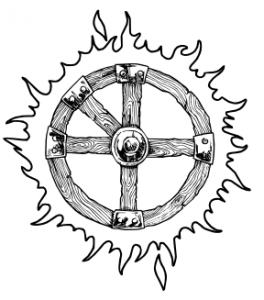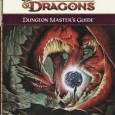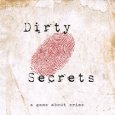 This weekend I was invited to “The Boy, The Bad, and The Ugly,” a weekend long birthday party convention at mrboy ’s house. In one way or another I played in all of the scheduled games (I’ll talk more about that as I review the con itself) but I had the honor of kicking off the weekend with a new installment of “The Gift”.
This weekend I was invited to “The Boy, The Bad, and The Ugly,” a weekend long birthday party convention at mrboy ’s house. In one way or another I played in all of the scheduled games (I’ll talk more about that as I review the con itself) but I had the honor of kicking off the weekend with a new installment of “The Gift”.
This game ran VERY different from my previous two. The dwarven prince (MrBoy himself) didn’t care nearly as much that the elves didn’t bring a gift, but wanted to see some action… post haste! Within minutes Prince Vost (better known in the game as Your Lordship) asked the elves to show their skill in battle by participating in a duel. The scene ended quickly as the prince sent the elves away and both sides prepared for a fight.
The duel itself had some pretty brutal stakes. The dwarven warden wanted to take the sword arm of the elvish captain, where as the elf wanted the match to end in a tie (for political reasons) but make an absolute mockery of the dwarf and make him loose his station because of his incompetence. First challenges and the stakes were already through the roof. I thought about entertaining Fight! (it certainly would have been appropriate) for the duel but the game was still very early on and I was still getting people used to the core mechanics so we decided on using a blood versus. The dice pools and corresponding results were through the roof. Yet somehow, despite the gigantic numbers, the roll resulted in a tie (I believe 18 vs 18, I know… crazy). Neither participant got what they desired and the duel (which neither had an “intent” to win) was determined by a die of fate. It was epic.
Meanwhile the uncle and the seneschal had noticed the mithril armor and the scheming began. Uncle Oxen sent cooks to rifle through the elves belongings to see if they had any other items of value in their quarters. After the duel the Captain in private told the Warden that even though he won, the Warden was the greatest warrior he had ever faced and handed over his bow. The bigot ranger, not privy to this gift returned to his quarters and found them ransacked. He found the Warden with his men inspecting the bow and assumed the greed dwarves had stolen it. The gloryhoud shouted his challenge to the warden as he let an arrow fly. Woot, using the range and cover rules!
The alarm was sounded and the ranger was captured by the troupes before he could finish off the nearly slain warden. The final scene was a court trial to determine the fate of the ranger, who wrongly attacked the warden but all of that was just pretence to test the steel of the elves. In the end they were given the choice, blood (give up the Ranger to the dwarves) or mithril (give up the prices armor) and they chose blood! It was freaking awesome!
What rocked
Every conflict was supercharged. The players were all amazing and they all played their characters to the hilt. Artha was flying like mad as every roll was critical. We had two different ties that both resulted in crazy, unexpected results.
Each duel of wits was filled with both sides vying for something they REALLY wanted. The players were very clear when they didn’t agree and the system backed them up.
Two characters “died.” The ranger was given to the Dwarves to be imprisoned for life (which is pretty damn long if you are immortal) and the Seneschal was overcome with greed, seeking out the Mithril heedless of the judgment made, only to spell his own doom. The captain and the warden however, developed a deep respect for each other and in the end the captain was ready to sing his song of boding to the first dwarf to ever receive such an honor. The outcomes were amazing.
What could have been improved
I am still not very comfortable with the range and cover rules so when we got into a ranged combat, I was feeling pretty shaky. Unfortunately, Shaun from TMD who was also in the conflict hadn’t used them much either so we all kind of bumbled through it. It worked but it was slow and I don’t think we got it all right.
There are SO many skills and traits on the character sheets that need a reference. I printed out the ones for the ranger but it took forever so I didn’t finish the other seven characters. I’ll definitely have to have that part ready before Kubla, looking them up in game takes WAY too long.
I’m wondering if Mouseguard has it right. One system for every type of conflict, fight, Duel of Wits, chase, etc. I’m going to have to play more MG.


18 v 18? OMGWTFBBQ? That’s awesome.
It was freaking amazing. Dwarven Greed, FoRKs, Helping dice, a Deed and other stuff I can’t even remember. It was NUTS. And Epic!
MouseBurning
Hi. Wandered over from the BW forums, where you are recommended newbie reading. I picked up BW the other day after looking at Mouseguard. I figured that since MG seems to have just used the Duel of Wits mechanic as the basis for every intense contest, I could buy the cheaper book, and have the toolkit to build to if I wanted it.
I have to admit, having started to tackle the books, I think MG might have it right. I also think the sheer number of skills and traits that need references is a little overwhelming.
Certainly for a convention game where being able to jump in quickly is important. In my long running Burning Wheel game we find that the insane diversity of skills has made for some really unique tactics as the players have virtually no overlap in their areas of expertise.
Good luck in whatever burning you do 🙂
Thanks.
Having gone through more and more of Burning Wheel, I am less and less enthused. It seems like each version re-invents details on conflict resolution. (Fight! DoW, Firefight!, Propoganda War!, MouseGuard).
I may have to find MonsterBurner in the FLGS and dig through it, since I am told it actually explains the reasoning/math/structure behind skills, traits, and lifepaths. As it is now, the whole thing smacks of “traits as exceptions/die roll extras”, which is a style I’ve never been fond of.
I love the basic die roll mechanic, I like shades. Beliefs and such are nice as a reward for roleplaying, but have little mechanical weight. (Maybe traits work to try and get that part in.)
It just seems that it’s a game of exceptions rather than one built on a cohesive structure. Like each genre is rebuilt from the ground up based on the core concepts, but with exceptions and details slathered on. IT seems very well constructed that way, but I doubt I would ever want to build a genre from scratch (which I would have to do for just about anything I would want to play). Maybe MonsterBurner will make that seem more palatable.